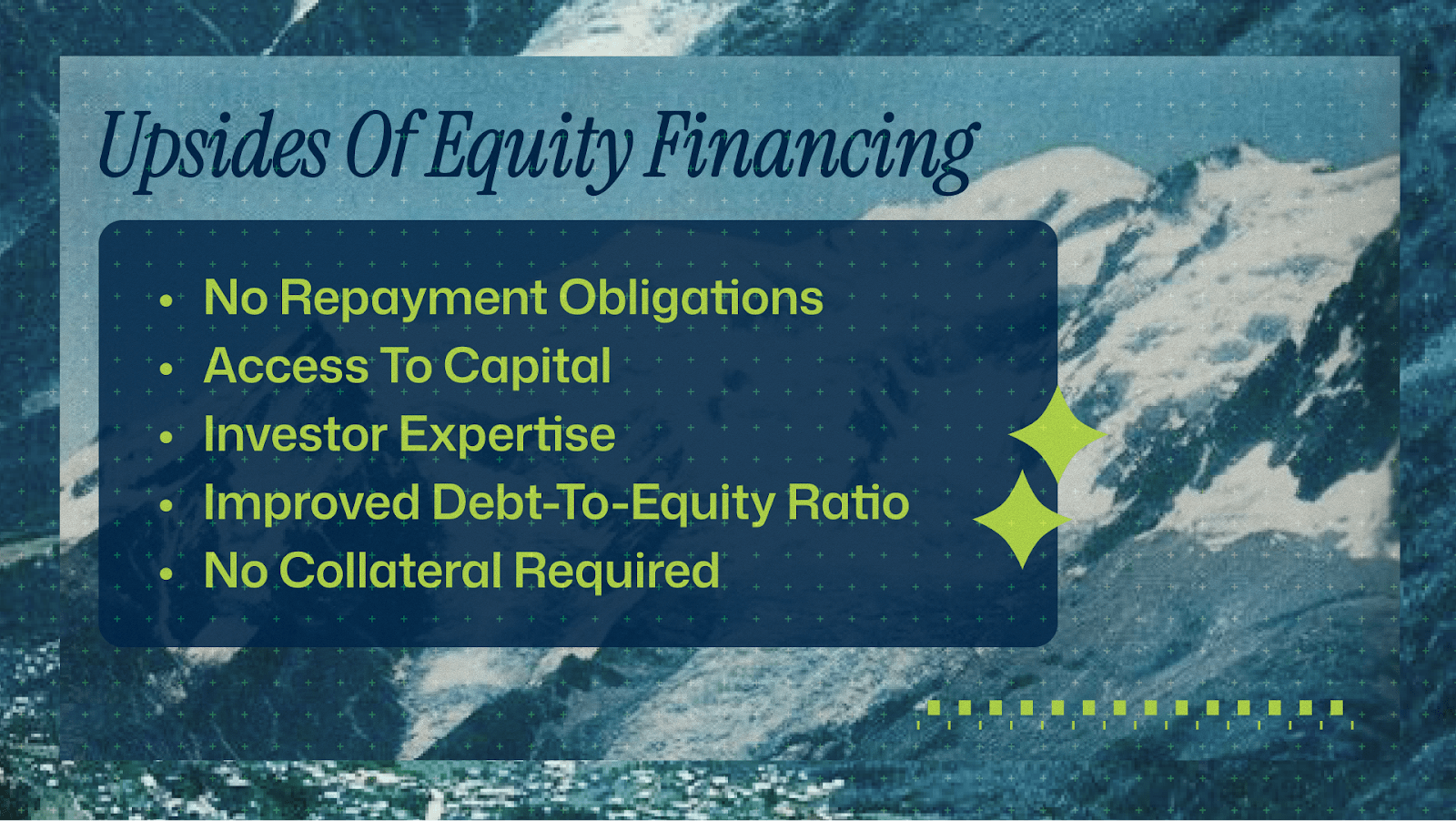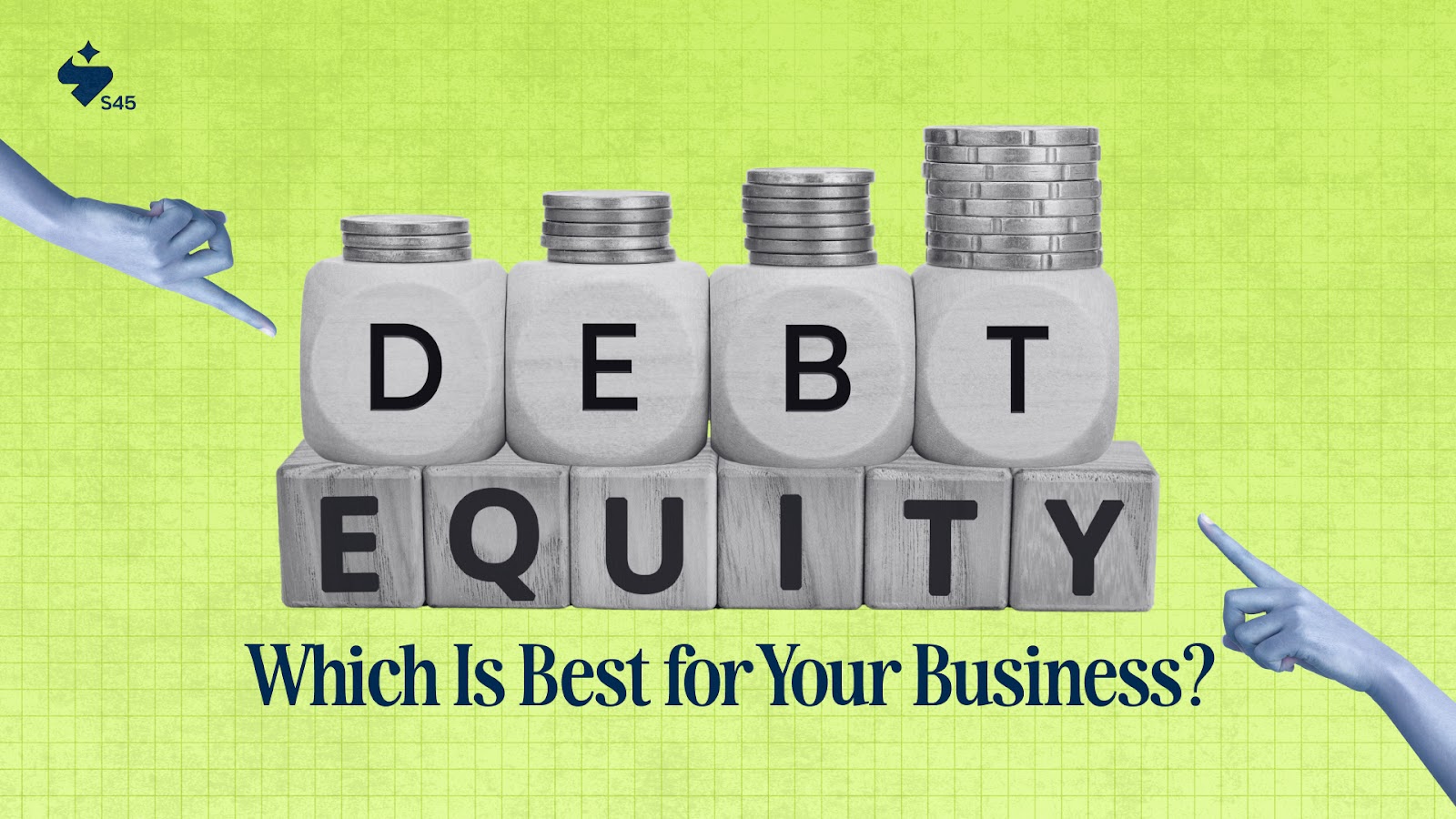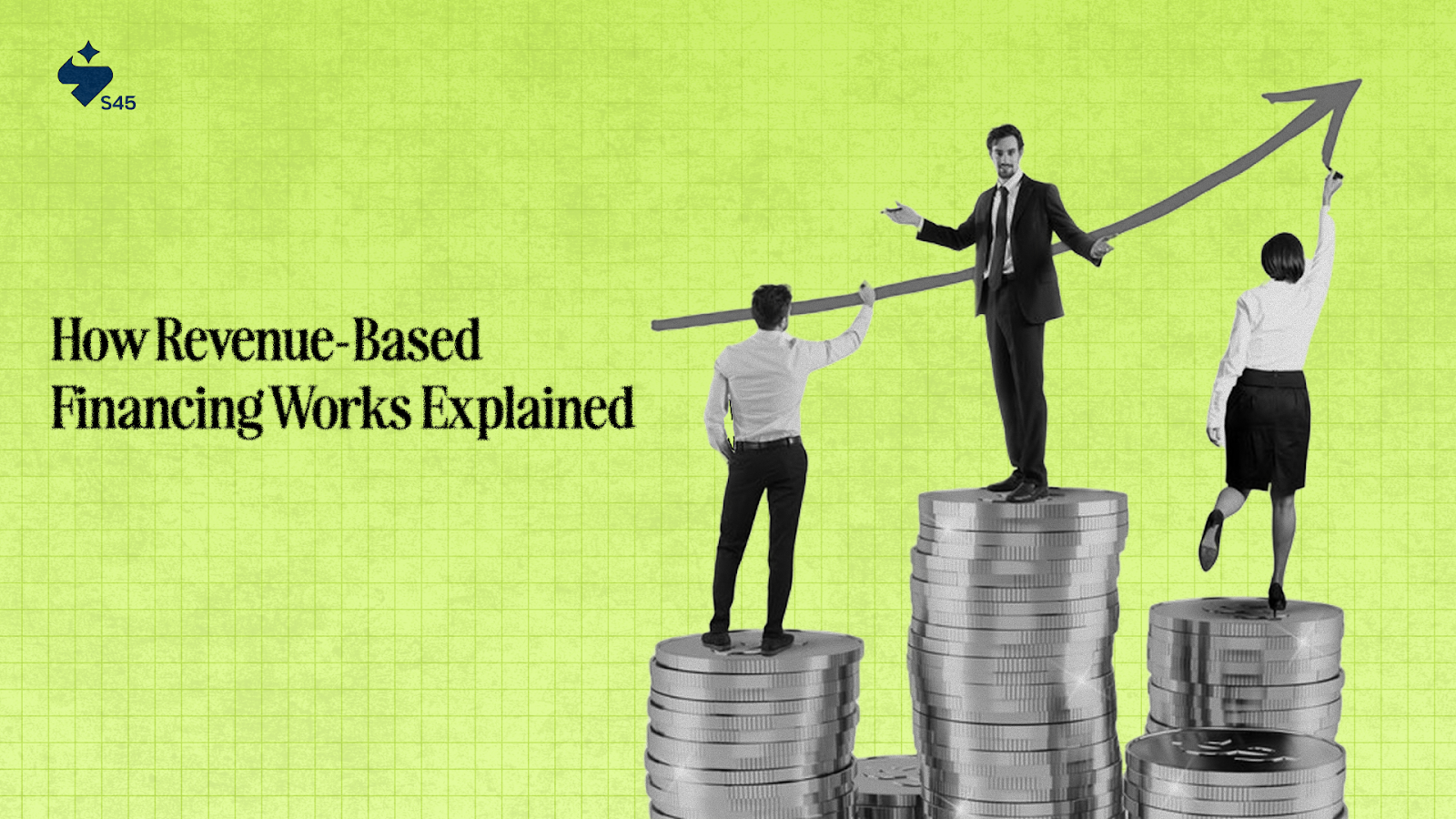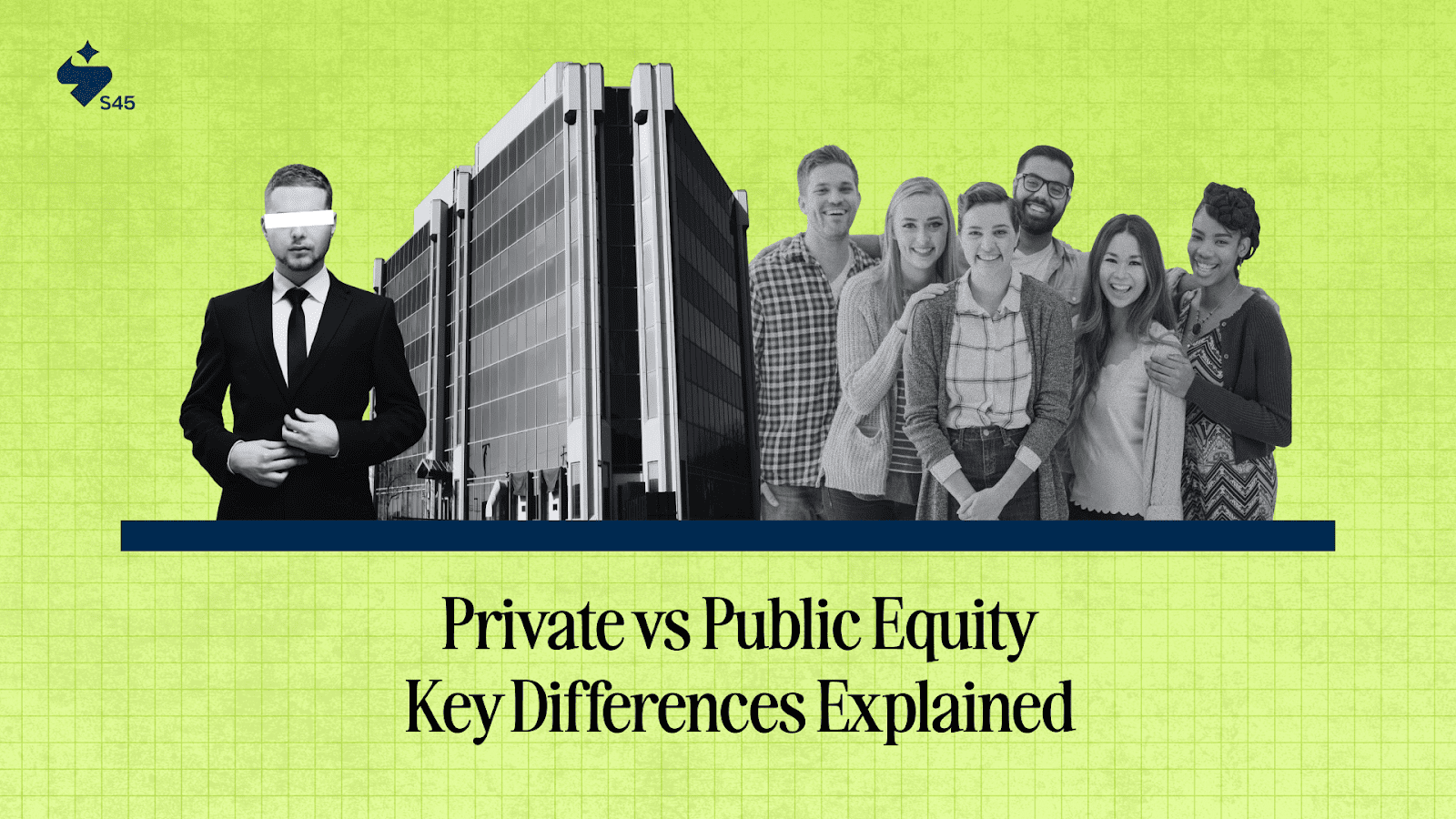
Key Takeaways:
- Debt financing allows you to borrow money with fixed repayment terms while retaining full ownership.
- Equity financing provides capital without repayment obligations but requires sharing ownership and profits.
- Your choice between debt and equity should depend on business goals, control preferences, and risk tolerance.
- Debt offers predictable costs and tax benefits but comes with repayment pressures and financial risks.
- Equity financing eliminates repayment concerns but involves sharing decision-making and profits.
- S45 offers expert advice to guide you in making the right financing decision for your business.
Private equity and venture capital (PE-VC) investments in India grew by 9% in 2024, reaching around $43 billion. This marks a strong recovery after two years of contraction, showcasing the growing opportunities for businesses seeking funding. With the increasing availability of capital, businesses now have more options than ever to choose from.
Understanding whether debt or equity financing is the best choice for your business is essential for long-term growth. This article explores the key differences between the two, helping you make the right decision based on your business goals and financial needs.
What is Debt Financing?
Debt financing involves borrowing money that must be repaid with interest over a set period. It allows businesses to access funds while retaining full ownership and control. The repayment schedule is fixed, making it easier to plan financials.
Example: A small business might take out a loan from a bank to purchase new equipment, agreeing to repay the loan in monthly installments.
Although debt financing helps retain control, it also brings specific benefits and risks. Understanding the pros and cons of debt financing can help you evaluate if it's the right fit for your business.
Why Businesses Choose Debt Financing (and What to Watch Out For)
Debt financing appeals to many business owners because it allows them to raise capital without giving up ownership. It offers predictability, tax advantages, and control, but it also comes with repayment obligations and potential financial risks.
Here’s why businesses choose debt financing.

- Ownership retention – You keep full control of your business and decision-making power since no equity is given away.
- Predictable costs – Fixed interest rates and repayment schedules make it easier to plan and budget.
- Tax benefits – Interest payments on loans are tax-deductible, reducing your overall taxable income.
- Faster access to capital – Loans and credit facilities can often be secured quickly than equity investments.
- No equity dilution – Your share in the business remains intact, ensuring long-term ownership security.
The risks associated with debt financing that you must consider.
- Repayment obligations – Fixed loan payments are mandatory, regardless of how your business is performing.
- Financial risk – Failure to meet repayment terms could lead to debt accumulation or, in worst cases, bankruptcy.
- Creditworthiness requirements – Lenders expect strong credit scores and financial records to approve loans with favorable terms.
- Collateral risk – Many loans require assets as security, putting property or equipment at risk if you default.
- Limited flexibility – Rigid repayment terms may restrict your ability to adapt during financial challenges or downturns.
These risks often force founders to ask an important question: Is there a way to raise capital without the constant pressure of repayments or the fear of losing collateral?
That’s where equity financing comes in. By giving investors a share in the company instead of signing up for fixed repayments, businesses can free up cash flow and focus on growth. But equity brings its own set of considerations, from shared ownership to diluted decision-making.
What is Equity Financing?
Equity financing is the process of raising capital by selling ownership shares of your business to investors. This means you give up a portion of your business in exchange for funding, and investors gain a share of the profits.
For example, a tech startup may offer equity to venture capitalists in exchange for funds to develop its product and expand operations.
Equity financing offers funding in exchange for ownership, but it also comes with its own set of benefits and challenges.
Is Equity Financing Right for You? Key Upsides and Risks
Equity financing involves raising capital by selling ownership shares in your business. While it can provide significant capital without the burden of repayment, it also means sharing control and profits.
Here’s a closer look at why founders choose equity—and the risks you’ll need to weigh before moving forward.
Upsides of equity financing that will help you.

- No repayment obligations – Unlike loans, the capital raised doesn’t need to be repaid, easing financial pressure on your business.
- Access to significant capital – Equity investors can provide a large influx of funds to support expansion, product development, or market entry.
- Investor expertise – Many investors bring industry experience, mentorship, and valuable networks that go beyond financial support.
- Improved debt-to-equity ratio – Raising equity strengthens your balance sheet, making your company more attractive to future lenders or partners.
- No collateral required – Since equity financing doesn’t require assets as security, your property or equipment isn’t at risk.
Some risks you need to manage with equity financing
- Loss of ownership – You give up a portion of your company, which may reduce your long-term control.
- Profit sharing – A share of your profits will go to investors, lowering your take-home returns.
- Dilution of decision-making – Investors often expect a say in strategic business decisions, which can limit your autonomy.
- Costly buyouts – If you decide to buy back equity in the future, the price can be steep if your business has grown significantly.
- Longer fundraising timelines – Negotiations, due diligence, and structuring deals take time, slowing down access to capital.
Choosing between debt and equity isn’t about picking one over the other—it’s about aligning capital with your growth stage, risk appetite, and long-term vision. That’s where S45 steps in, helping founders evaluate trade-offs with clarity and precision.
Before you decide, here’s a side-by-side comparison of both options.
Debt vs Equity: How to Decide What Fits Your Business
Deciding between debt and equity is about the kind of control, risk, and flexibility you want for your business. Here’s how to think about the trade-offs as a founder:
- Control vs collaboration: Debt keeps full ownership in your hands. You call the shots, but you’re also solely responsible for repayments. Equity means giving up some ownership, but in exchange, you bring in investors who may add expertise, networks, and long-term support.
- Predictable revenue vs growth runway: If your business has steady, predictable cash flow, debt can be a practical option since you know you can cover monthly repayments. If you’re still pre-revenue or in aggressive growth mode, equity buys you time and flexibility without the immediate pressure of repayment.
- Tax savings vs equity strength: Interest on debt is tax-deductible, which can lighten the financial load. Equity doesn’t offer that perk directly, but it strengthens your balance sheet by improving your debt-to-equity ratio, making you more resilient in the long term.
- Short-term speed vs long-term partnership: Debt is often faster to secure if you’ve got good credit history. Equity takes longer — negotiations, due diligence, and paperwork — but it also means building a relationship with partners who have a vested interest in your success.
At the end of the day, the right choice depends on what stage your business is in and what matters more to you: control and independence, or shared risk and long-term backing.
Comparisons only go so far — at some point, you need to weigh what actually matters for your business. The right financing option isn’t universal; it depends on your goals, risk appetite, and where your company stands today. Here are the key factors that should guide your decision.
The Non-Negotiables: What Really Drives Your Financing Choice
When choosing between debt and equity financing, many key factors need to be considered based on your business's goals, financial situation, and risk appetite. It's crucial to evaluate each factor to make an informed decision that aligns with your business objectives.
- Business goals and growth plans → Do you need a large capital boost for rapid expansion, or are you looking for manageable funding while keeping control?
- Control and ownership → Is retaining full decision-making power essential, or are you open to sharing the table with investors who bring expertise?
- Cost considerations → Would you rather commit to predictable interest costs now, or share a slice of future profits later?
- Risk tolerance → Can your business comfortably handle fixed repayments, or do you need the flexibility of not owing money back right away?
- Time constraints → Do you need funds quickly to act on an opportunity, or can you invest time in building investor relationships?
Even with a clear checklist, the decision between debt and equity financing isn’t always straightforward. Each founder’s situation is different — from growth stage to industry challenges to personal risk appetite. What looks good on paper may not align with your long-term vision.
That’s where S45 comes in. We don’t just explain your financing options — we help you translate them into real-world impact for your business.
Making the Right Financing Decision With S45 by Your Side
S45 helps businesses secure the right financing solutions based on their specific needs and goals. With a strong understanding of the capital markets, S45 offers strategies that support your financial growth. Their expert team works closely with you to find the best financing options, whether debt or equity.
Here's what S45 offers:
- Smart Capital Timing: S45 helps assess the right moment to bring in external capital, whether for structured funding, secondary exits, or pre-IPO rounds, ensuring alignment with your business's growth stage.
- In-Depth Due Diligence: With investor-focused insights, S45 helps you understand your company's fundamentals, valuation drivers, and cap table hygiene, keeping you always pitch-ready.
- Risk Clarity: Evaluate important trade-offs like dilution, liquidity, and exit complexity before committing to any funding path, ensuring you make informed decisions.
- Long-Term Equity Advisory: S45 offers strategic guidance on ESOP liquidity, partial exits, and institutional capital, helping you plan not just for the next round but for sustainable growth in the future.
Get in touch today to discover how S45 can help your business grow.
Conclusion
Choosing the right financing option for your business depends on your goals, risk tolerance, and financial needs. Debt financing helps you retain control but comes with repayment obligations and financial risk. Equity financing provides capital without repayment pressure, but it requires sharing ownership and profits.
Understanding the debt vs equity financing pros and cons helps you make the best decision.
S45 supports businesses by providing expert guidance and smart capital solutions. Whether you're considering debt or equity financing, they help align your strategy with your growth objectives. Contact S45 today to discover how they can help in securing the right financing for your business.
FAQs
Q. What factors should I consider when choosing between debt and equity financing?
A. Consider your business goals, control needs, and risk tolerance. Debt financing allows full control but involves repayment obligations, while equity financing offers capital without repayment pressure but requires sharing ownership.
Q. How does debt financing impact my business’s creditworthiness?
A. Debt financing can affect your credit score positively if payments are made on time, but negatively if repayments are missed. Your creditworthiness influences loan terms and eligibility for future financing.
Q. What is the role of the S45 in helping businesses with financing decisions?
A. S45 provides expert guidance on choosing between debt and equity financing. They offer strategic advice, capital timing, and investor connections to ensure you make the best financing decision for your business.
Q. How does S45 help businesses prepare for future funding rounds?
A. S45 offers long-term equity advisory, helping businesses plan for ESOP liquidity, partial exits, and securing institutional capital, ensuring a solid foundation for future funding opportunities.
Q. Can I combine debt and equity financing for my business?
A. Yes, many businesses combine both to optimize capital. Debt offers immediate capital without giving up ownership, while equity provides long-term growth without repayment pressure, balancing financial risk and control.


